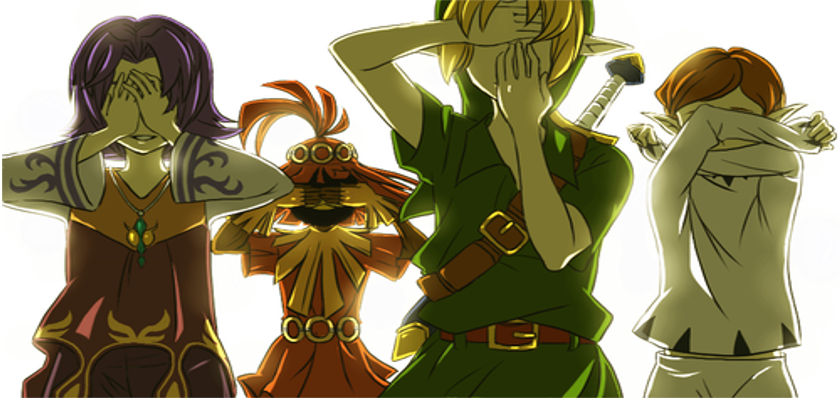The Truth of the Masks in Majora’s Mask
Posted on October 18 2014 by Dathen Boccabella

Around here, The Legend of Zelda: Majora’s Mask is both a favorite and a game that many fans are sick of hearing about. It’s been 14 years since the game’s release and still there are new articles being published on its underlying meanings and messages. For many, the game has been thoroughly over-analyzed with articles they deem to be cringe-worthy.
A trend in many of these articles is to acknowledge that Majora’s Mask is a darker, more mature game, but to then always spin that in a positive light. While they accept the game’s premise of life’s finiteness, articles always spin this as a message to embrace living for today.
Optimistic analysis prevails, despite the source material of the game also being quite pessimistic. Take for instance the game’s central premise of wearing masks. Many take it as a message to be yourself and not hide away who you are, which is accurate, but we cannot ignore that the game also argues that sometimes wearing masks is necessary.
Typically, articles detailing the themes of the masks in Majora’s Mask focus on them as a negative thing that suppress our personality or true selves. They highlight characters such as the Skull Kid using Majora’s Mask to hide his own insecurities, eventually becoming consumed by the power of the mask.
Mask-wearing is painted in a negative light that in time will suppress your individuality. Take Shiro the guard for instance, who dons the Stone Mask and becomes as “plain as stone.” He becomes invisible so that he “blend[s] into backgrounds and move[s] about without being noticed.”
Majora’s Mask warns of this danger of losing yourself to facades, but it does not contain a message explicitly against wearing masks. As a personality trait, to be “plain as stone” is a bad thing, yet when it comes to blending in and functioning in society, fitting in with the other pebbles is crucial.
Consider masks like social etiquette and politeness. Our true faces are what we’re truly thinking, but to inappropriately blurt out our constant thoughts is a destructive thing. Masks can be a form of very necessary social self-control.
 Some masks help us through our day. Take, for instance, people who wear make-up to give them confidence. While its nice to think there isn’t discrimination, its ignorant of the reality that people need their masks to be comfortable in our judgmental world.
Some masks help us through our day. Take, for instance, people who wear make-up to give them confidence. While its nice to think there isn’t discrimination, its ignorant of the reality that people need their masks to be comfortable in our judgmental world.
Mere days before his wedding in Majora’s Mask, the character Kafei is cursed with the appearance of a child; loses his wedding gift for his fiancée Anju; and loses the courage to face the people in his life given these circumstances. To even be able to go outside he hides all of his insecurities behind the Keaton mask. Wearing a mask gives him strength, however little.
The Bremen’s Mask gives Link a cult of personality, the ability to lead, albeit only for animals. It’s like any boss or leader having to put on a strong face to lead their people, despite what they may be going through personally. To be unmasked all the time is instability.
Consider also in Majora’s Mask the need to wear masks and fit a certain mold to be accepted. When joining the adolescent group, The Bombers, as a Deku, Link is denied membership. As a person he is granted full access. Similarly, to be welcomed into the Milk Bar, Link must wear Romani’s Mask, or to access Ikana Canyon he must wear the Garo Mask.
To be accepted and achieve our needs and goals, masks are necessary. Consider the stalfos of the Ikana graveyard, who are hostile and violent towards Link until he dons the Captain’s Hat and is welcomed as one of them.
The message of Majora’s Mask is not definitively that masks are intrinsically good or bad; it’s that they are merely a tool of living that can be a positive or negative power. We can become consumed by our masks, and lose ourselves, true, but the masks in our lives can also give us confidence and help us to function.
The central theme of the game is embracing masking aspects of ourselves as necessary, but exerting caution. Wear masks to make yourself and others comfortable, but remain able to take them on and off. Don’t leave them on. Maintain control.
If there is an optimistic moral at the heart of Majora’s Mask it is that, through it all, people who care, those who matter, see through your masks to the extent that your masks don’t matter to them. They see through to your heart like the game’s Mask of Truth.

There are several examples of this. Despite Skull Kid masking his frailty behind Majora’s Mask, to devastating ends, his friends in the Four Giants, Tatl, Tael and even Link still don’t forget who he is beneath it. They pity what he has become, a slave to his mask, but still care for him beneath it all.
Despite being in a cursed childish form, and hiding behind the Keaton Mask, Kafei’s fiancé Anju still loves and accepts him despite his appearances, because she fell in love with the face beneath the mask. To unmask with someone is to be intimate; it is something special.
To live life constantly unmasked makes you vulnerable and susceptible. To hide your emotions from your professional work colleagues and then to later vent to a friend or partner is a form of masking and unmasking. It is necessary. Link would never have made it far without the ability to wear and swap masks, nor would we.
Ponder the following four quotes from the children on the moon. Their questions are not judgmental towards our masks as negative or positive, they are questioning the ability of masks to make us happy, to make others happy and how revealing our true face is central for a deep and enduring friendship.
“Your friends… What kind of… people are they? I wonder… Do these people… think of you… as a friend?”
“Your true face… What kind of… face is it? I wonder… The face under the mask… is that… your true face?”
“The right thing… what is it? I wonder… if you do the right thing… does it make… everybody… happy?”
“What makes you happy? I wonder… what makes you happy… does it make… others happy, too??”
Adult life is about knowing when wearing a mask is necessary, be it suppressing your anger for the sake of politeness, hiding insecurities to boost your confidence, or compromising for the sake of peer acceptance. However, it’s also about knowing when to remove your masks so that you can just be comfortable being yourself. Finding this balance is essential to a successful and fulfilling life.



